Introduction
The John Oliver Digital Immersion Mini School is one of the several enriched and accelerated school programs present within the VSB’s high schools. An overview of the program’s core principals and philosophies is presented on their blog. I attended the John Oliver mini from grade 8-12.
A month ago, a friend from high school sent a message in our discord server; the JO mini was hosting an info night for grade 7 students and parents interested in finding out more about the program, and he’d been invited to speak at the event. I live a couple blocks away from John Oliver and, finding myself free on the evening of the info night, decided to head down to the auditorium to listen to the teachers and students speak about what the mini school meant to them.
Arriving at the auditorium, I was greeted with smiles and hugs from the mini school teachers and chatted with the grade 10s and 11s who’d volunteered to present. Before the event began, Mr. Lau, one of the head mini teachers, asked if I wanted to speak on my experience in the program. I hadn’t prepared anything, and looking out into the audience of watchful parents I felt nervous that I wouldn’t be able to eloquently represent the mini school. However, I pushed myself to say yes, trusting myself to speak from the heart as to why prospective students should join the program. Listening to Mr. Lau introduce the program’s core values, I was surprised by the stories and connections I made from my experiences in the mini to my present-day life and growth.
Heading home after helping stack up the chairs and saying goodbye to the teachers, I asked myself why I showed up that night. The reason I put on a dress shirt and my nice jeans, made myself a nametag with “2020 Alumnus”, and walked over to the school that windy October night was because the mini school community inspires me to push myself while staying grounded in who I am as an individual. The John Oliver mini school is the formative life experience that fostered my growth into the driven person I am today, and carries on positively influencing my actions as I continue to explore the world.
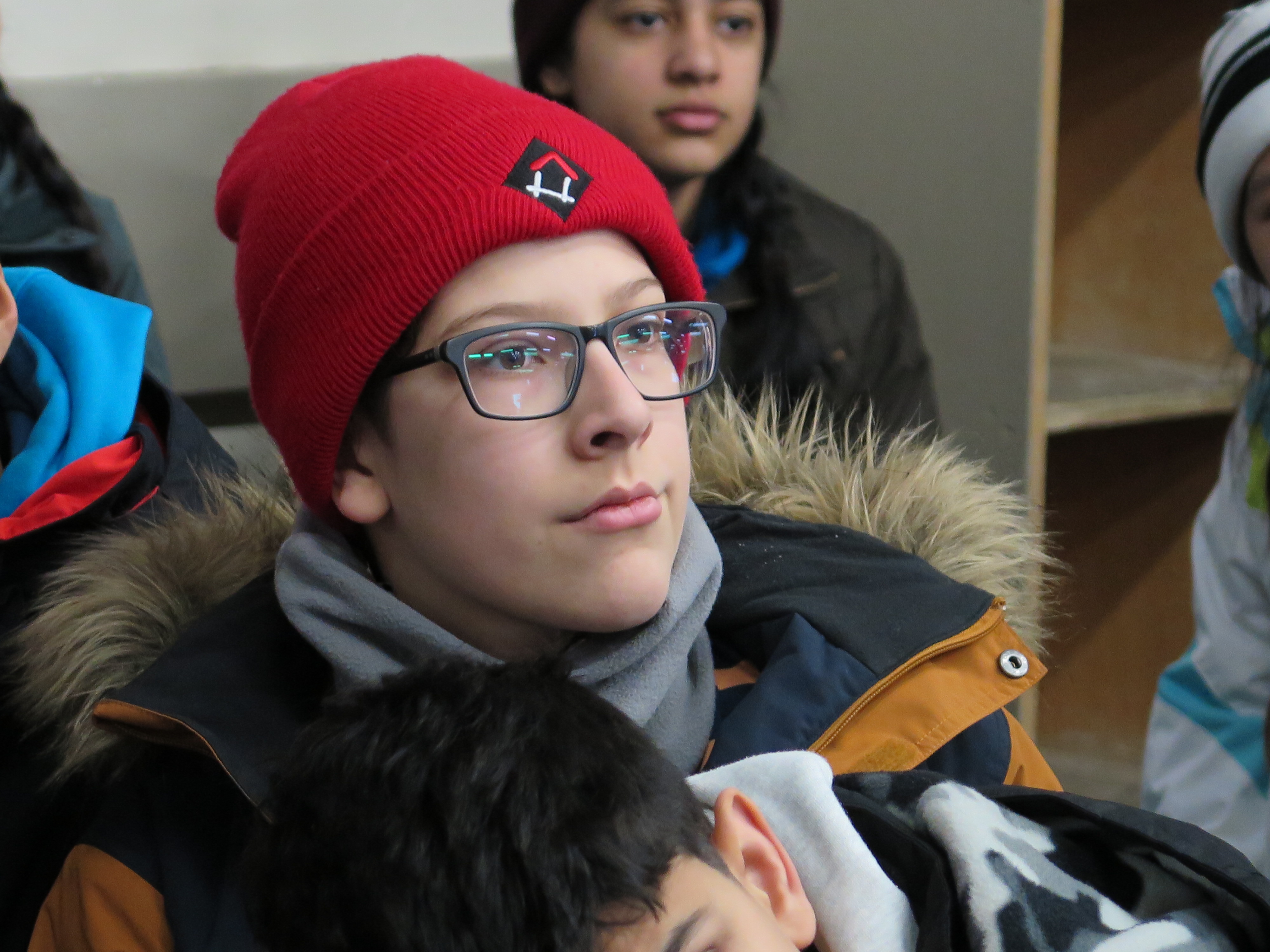 Me in grade 8 during the games night of my first trip to Sun Peaks. I’d never been on a mountain, let alone skied before this trip.
Me in grade 8 during the games night of my first trip to Sun Peaks. I’d never been on a mountain, let alone skied before this trip.
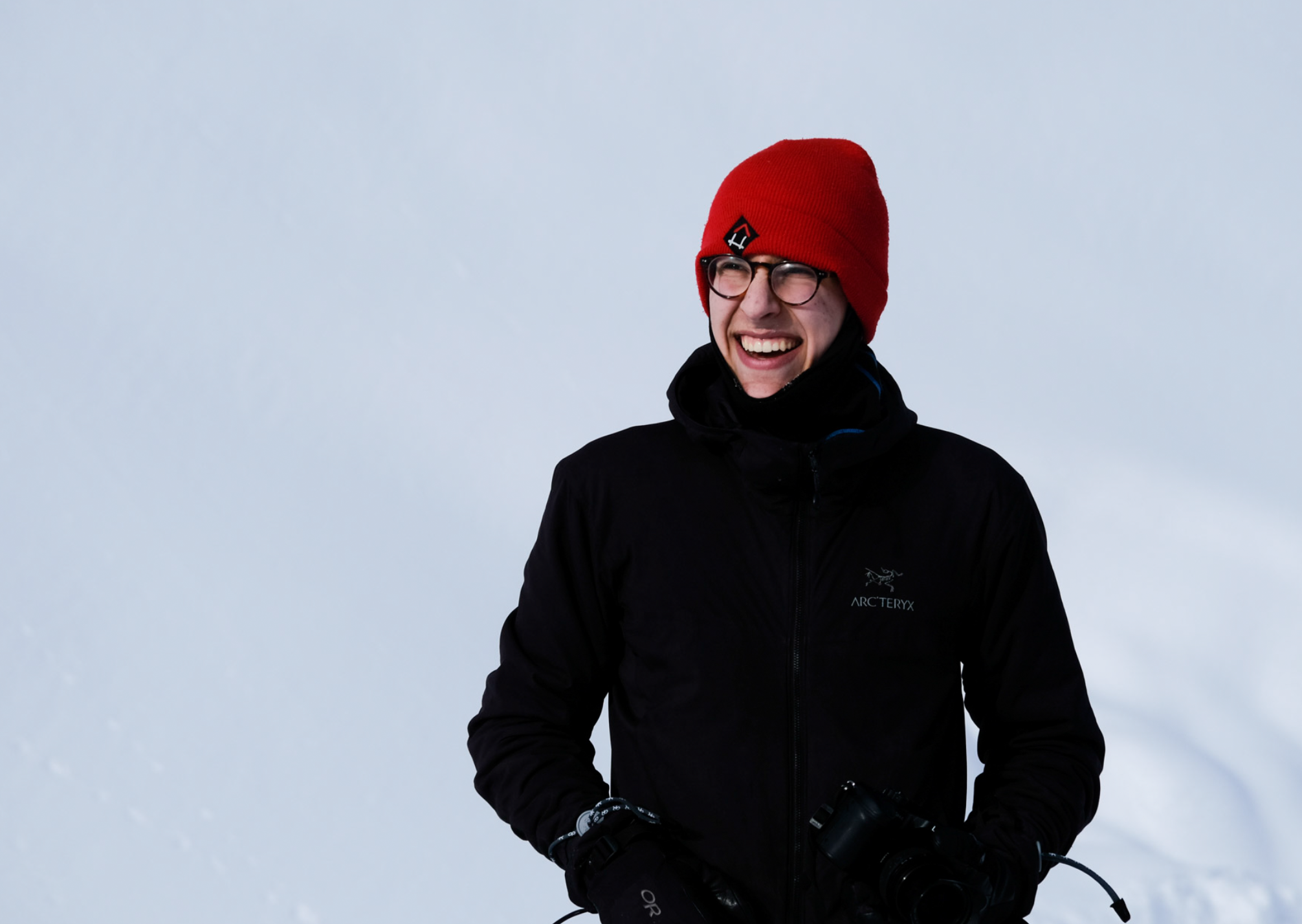 Me in third year university cross-country skiing in Golden BC during a spontaneous reading-break trip with friends.
Me in third year university cross-country skiing in Golden BC during a spontaneous reading-break trip with friends.
Take the Initiative
In grade 10, the mini school took a trip to Bamfield Marine Sciences Center on Vancouver Island. After evenings of lectures on marine biology, early mornings waking up in cold dorms, and the soggy climate of the island, our group headed out in a boat to explore the diverse spines and sponges underneath the center’s docks. Getting back to shore, we extracted ourselves from the boat, and as I stood on the dock taking in the surroundings, the instructor held out the mooring line and asked me to tie the boat to the dock. I had no idea what to do, and with all my classmates waiting quietly behind me, felt terrified I would embarrass myself. I gestured to a friend beside me, trying to give the impression that I thought the rope was meant for him, and he stepped up to tie the boat off.
Walking back to the dorms, Mr. Lee, one of the head teachers at the mini school, pulled me aside, and with serious, sustained eye contact, said, “you should’ve taken that rope”. I felt like I’d suddenly fallen off that boat into the frigid ocean. Mr. Lee had not only seen through my act of passing off the rope, he’d seen the embarrassment and lack of confidence I’d experience in that moment.
By not taking that rope, I’d deprived myself of an immense growth opportunity. Not only had I missed the chance to have an expert show me how to tie a boat to a dock, but I’d reinforced a negative mindset towards activities that I didn’t know how to do, or wasn’t good at. I vowed to impress Mr. Lee by volunteering every time an instructor asked for an assistant or when there was an opportunity to visibly push myself out of my comfort zone.
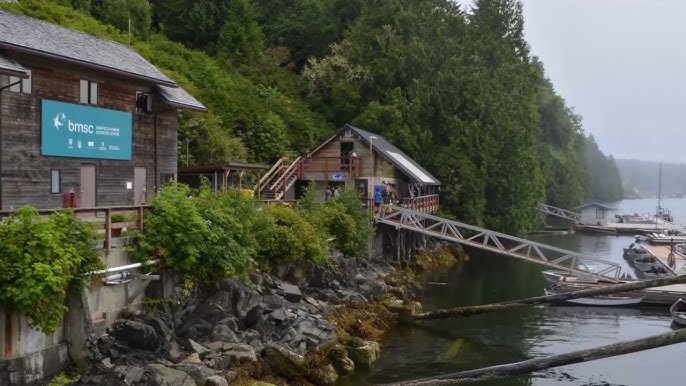 A dock at the Bamfield Marine Sciences Center
A dock at the Bamfield Marine Sciences Center
Mr. Lee’s focus on stepping out of your comfort zone was front-and-center during every trip and in-class activity. As the Socials and Leadership instructor, Mr. Lee would always tell us to “take the initiative”. He repeated this phrase so often that, like with many other teacher’s habits and idiosyncrasies, our class would sometimes use it as a joke. However, we all internalized the importance of taking the initiative. To me, taking the initiative means actively creating situations that will push me out of my comfort zone in order to positively influence my growth.
I thought back to that feeling of frightened paralysis at Bamfield during the Cansbridge Info Night this September, when presenters asked the gathering of 60-70 students whether someone wanted to get up and deliver a one-minute personal pitch. I felt that same crushing fear in the silence of the room after the question, but unlike Bamfield, I took that as a sign to force my hand up high and lock eyes with the presenters with a grin on my face. Sitting back down after that one minute pitch, I was acutely aware of the journey grade 10 Mischa had made - I felt so proud that I’d faced a challenge which a past version of myself would’ve skittered away from.
I owe the fact that I find it habitual to take the initiative to push myself of my comfort zone to the mini school providing many opportunities to encourage me and my classmates to take the initiative.
Jokers Classic
Jokers Classic is a week-long basketball tournament held at John Oliver where high teams across the VSB compete each year. Mr. Lee’s Leadership 9 class is nominally responsible for setting up and running the event, part of which includes securing corporate sponsors from the community. Armed with a sponsorship letter and our Leadership 9 t-shirts, we’d identify local businesses to canvas and went door-to-door to speak with store managers and ask for donations. At the time, I wasn’t confident when speaking to these businesses, didn’t know how to “sell” Jokers Classic as an event, and wasn’t prepared to deal with the overwhelming rejections that we received.
Fast forward seven years to my time as Electrical Lead of UBC Solar, where it quickly became second-nature for me to sponsor items for the team. As soon as a project’s design was finalized, I’d be thinking about what items we could get sponsored, from wireless radio receivers to debugging dongles. I wrote targeted sponsorship emails, called companies when they didn’t respond, and negotiated sponsorship agreements that produced value for both sponsors and UBC Solar. Due to Mr. Lee pushing us to take the initiative to seek out sponsors for Jokers Classic, I was able to confidently take the initiative to acquire corporate sponsors from across the globe for UBC Solar and raise more than $15,000 in the process.
IDS
Independent Studies is a year-long project that students in the mini school undertake each grade. The goal of each IDS project is to deep-dive on your interests and motivations to isolate a passion project that, in the process of completion, would upgrade your time management and problem solving skills while forcing you to reckon with the challenges associated with long-term commitment to driving an idea to completion.
In grade 10, I was fascinated by the idea of genetic editing - the novel CRISPR-CAS9 technique buzzing around the news captured my imagination with its possible applications. Deciding to explore genetics for my IDS, I focused on genetic sequencing, the process of decoding the order of As, Gs, Cs, and Ts in a specific section of DNA. Eventually, I came up with the problem statement for my IDS project - I wanted to create the world’s first self-contained Sanger Sequencing machine. As lofty a goal as this was, Mr. Spence, my IDS teacher at the time, didn’t limit my scope. He encouraged me to challenge myself to build my idea, and to learn as much as I could about genetics and engineering design as I could in the process. In fact, Mr. Spence contacted a biology teacher at JO who’d been awarded a $5,000 grant for student projects, and made an agreement to make some of these funds available for my project.
Over the course of the next four months, I took my first serious step towards the Engineering career path I’m on today. I read my first scientific journals, had my first experience deciphering electrical schematics, and had my first success reaching out to a genetics professor at the University of Michigan. I grappled with how to take effective notes to organize the flood of independent learning I experienced, ranging from how lasers worked to why DNA samples needed to be centrifuged before undergoing PCR. The night before the project fair, I found myself in my garage, cutting open a shoebox to dump the electronics of my project into while practicing my project pitch.
The “paper” I produced in 2020 about my grade 10 IDS prior to applying to an innovation scholarship
The product produced from the project was a complete failure. I had no idea how to assemble the incomplete list of electronic components I’d ordered. I had hundreds of dollars of DNA polymers and reagents in my freezer, with no assembled machine to test them in, let alone any procedure to do so. When I realized I’d neglected to 3D print my centrifuge, I ended up sticking a Dremel into the center of my shoebox as a showpiece. In retrospect, I’m sure Mr. Spence knew that I wasn’t going to be able to build the world’s first miniature DNA sequencer. Instead, he understood that in the process, I’d make thousands of growth-critical mistakes around timelining a project and creating lab-grade procedures while learning how to order samples from scientific companies and reading datasheets for the first time. In short, I’d learn what it meant to follow my passion as a biomedical engineer.
 The PCR section of the sequencer, made out of a heat sync, Arduino Mini, and thermocouple.
The PCR section of the sequencer, made out of a heat sync, Arduino Mini, and thermocouple.
Today, I still get teased by my friends about the shoebox I showed up with at the IDS fair that year. I laugh these comments off because I’m grateful that when Mr. Spence heard my passion for this project and supported me shooting for the moon, he encouraged me to take the initiative to push myself so far beyond my comfort zone and traditional scope of an IDS that I discovered a new dimension of passion, engineering, and driven curiosity that I continue to explore today as an Engineering Physics student.
This emphasis on yearly projects oriented around discovering and exploring your passions is something that’s ingrained in my life today. I’m always reflecting on the patterns of my interests to pinpoint emergent passions and am constantly undertaking new personal projects. It feels strange to not have a side project on the go at all times, be it something small I tinker with like my home server, or something as all-encompassing as UBC Solar. This constant applied curiosity is something that my mini school friends exhibit as well. Whether it’s joining a project management club, working on a discord bot, or learning a new programming language, my friends constantly keep themselves busy with passion projects that align with their philosophy of being life-long learners.
Physical Comfort Zones
I come from a family of home-bodies. Nothing sparks more joy for me, my mom, and my dad than making some tea and curling up on the couch to watch a movie. Of course, I’m so grateful to my parents for putting me in every physical activity program offered at Vancouver’s community centers at a young age, but we were never going to be that family that drove out to Whistler to go hike on a long weekend.
The mini school pushed me out of my physical comfort zone during every trip we went on. I encountered the thrill of skiing at Sun Peaks and discovered the calm in the crisp winter air while snowshoeing at the top of a mountain. During our trips to Strathcona Park Lodge on Vancouver Island, I experienced the brutal romanticism of canoeing for hours in the rain to an island where we camped under a tarp for the night (my clothes smelled like campfire smoke for the next month). During our trips to Seattle and Ashland, I discovered the joy of exploring a new city, and while travelling in Alberta, realized that one should avoid long-haul bus rides at all cost.
Memories of the mini school trips surfaced during UBC Solar’s competition this summer when we camped for 18 nights straight across more than 7 states in the USA. On the last day of FSGP in Bowling Green, we finished a full day of racing, packed up our entire garage and trailer, and hit the road, making it to our campsite outside Nashville late into the night. In pitch-black darkness of the forest, I clamped a flashlight tightly in my mouth while I unloaded the team’s tents from our trailer, and, avoiding millipedes and spiders the size of my fist, quickly set up my tent. I was about head to bed when I noticed a team member struggling with their tent. “Is this your first time camping?” I asked as I helped them put together their tent poles. They nodded yes. In that moment, I felt immense gratitude to the mini school teachers for exposing us to trips that forced us to learn to cook, clean, camp, travel, and take care of ourselves at such an impressionable age. For each of those 18 days, it was second nature to live out of a duffle bag, to shower in a hut behind an RV park, and to shop for and cook hearty meals that set the team up for another powerful day on the road.
 Members of UBC Solar outside of Salt Lake City waiting for a tow truck after the suspension snapped on our trailer
Members of UBC Solar outside of Salt Lake City waiting for a tow truck after the suspension snapped on our trailer
Being exposed to new outdoor experiences through the mini school made it easier for me to venture outside of my comfort zone as I got more involved in rock climbing in 2023. In May of that year, my friend Alex invited me on a climbing trip to Red Rocks, a national park outside of Las Vegas and a world-renowned climbing destination. Without hesitation, I said yes, and a couple weeks later, found myself getting off a plane in Nevada feeling the same excitement I first felt when getting on the chair lift for the first time at Sun Peaks.
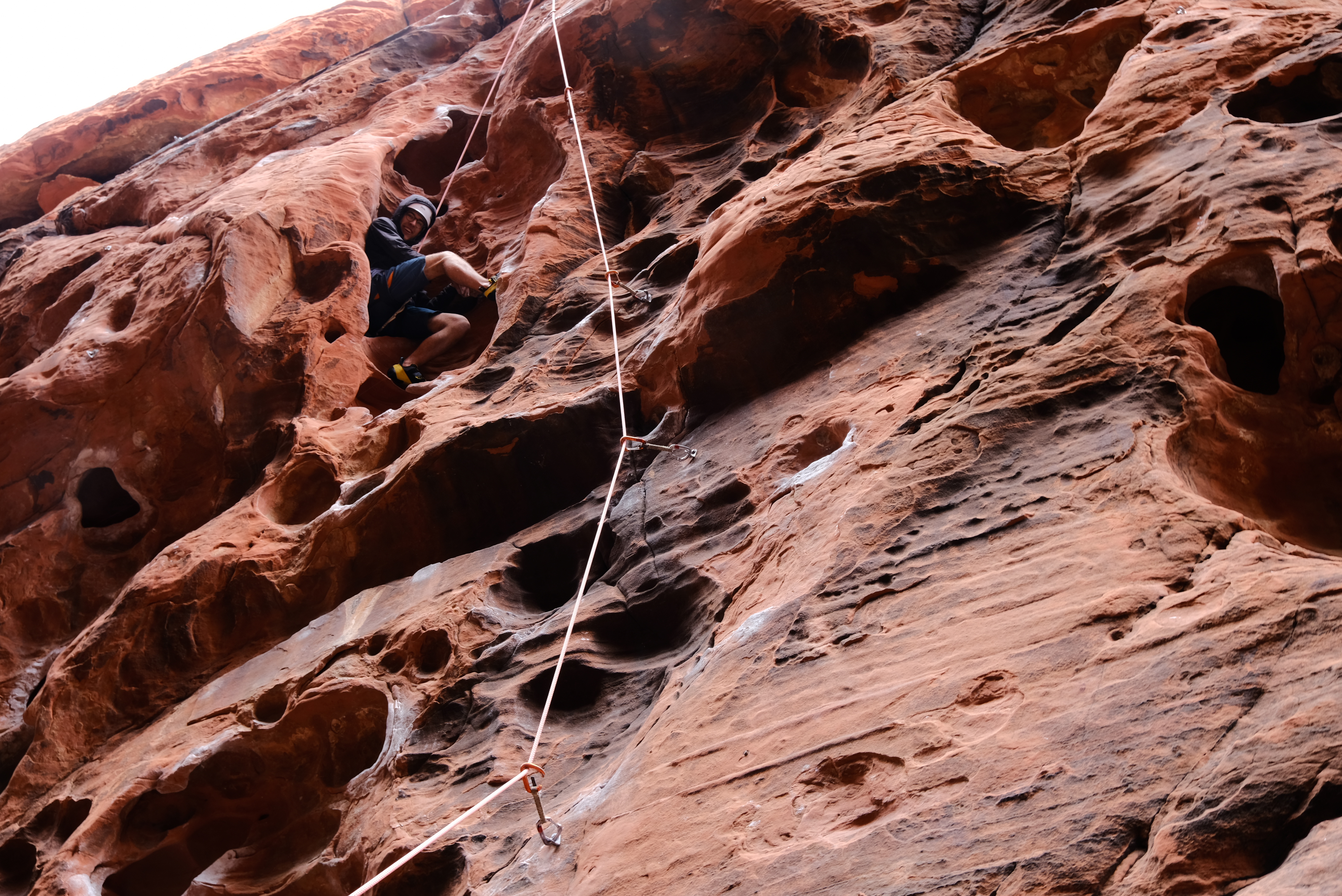 Sport climbing in Red Rocks
Sport climbing in Red Rocks
Family Values
The most important part of the mini school wasn’t the teachers, or the trips, or even the emphasis placed on pushing yourself and growing out of your comfort zone. It was the fellow students that shared those same values and experiences who I grew up with over five years, and who I now consider family.
Inspiring Together
There’s a resonance effect on my drive and passion that happens when I’m surrounded by a group of equally, and ideally more, motivated, hard-working, and thoughtful individuals. Being surrounded by the same community of 28 students over the course of five years of high school, the energy we channeled through each other produced growth and impact that was orders of magnitude beyond what would’ve been produced working alone. Every member of my mini family pushes me to work harder and aim for higher goals because I admire their work ethic and accomplishments. A common way I’ll describe a close mini school friend to new folks is saying, “he’s one of the smartest people I know”.
In class, we pushed each other academically, comparing grades and helping with homework during lunch in the cafeteria. When it came time to apply to universities, we excitedly shared the scholarships we were applying to, and compared which schools out east had the best computer science and engineering programs. At the end of the first term of grade 12, I remember meeting up with my friend Jason at our local library to workshop his UBC application. Months later at the beginning of COVID, I was working out in my living room when he messaged me to say he’d gotten into UBC.
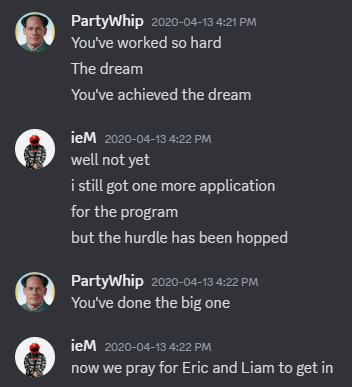
The reason I wanted to major in ENPH at UBC was because of it’s similarity to the mini school - a close-knit cohort of academically motivated students with diverse interests who’d support each other to work harder and learn more in a program that pushed students out of their comfort zones.
Growing up with your best friends sharing similar values of leadership, motivation, life-long learning and taking the initiative, these values became ingrained in our collective consciousness. Throughout high school, we encouraged each other to take on challenges and opportunities for growth. Although I wasn’t the most interested in entrepreneurship, many of my friends were, and so I joined Summit Leaders and built out my first ever business proposal. In grade 11, my good friend Eric began working as a tutor at Smart Kookie Tutorials and soon after, several members of our class, myself included, began working there as well - kickstarting my journey as a tutor for various organizations over the next four years.
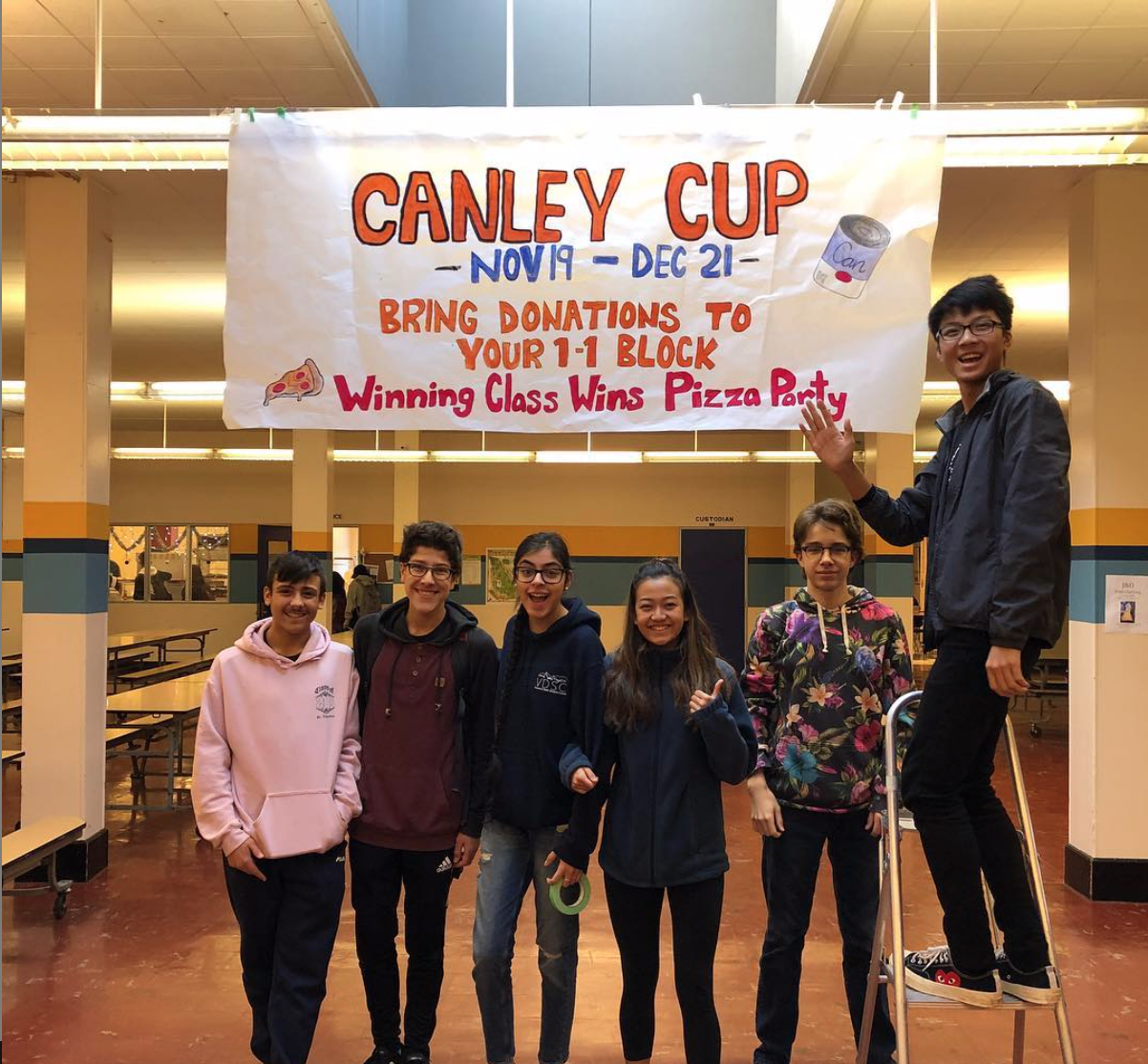 Organizing a food bank donation drive as part of JO’s mini-school-lead student council
Organizing a food bank donation drive as part of JO’s mini-school-lead student council
That same year, me and three other friends were given the opportunity to participate in a hackathon at Microsoft, and had our eyes opened to the possibility of pursuing a career in the computer science industry - taking the initiative to join this hackathon pushed several of my friends into their CS-related careers today. I remember walking into Microsoft that first day marveling with Eric at the expensive chairs around the office. Today, Eric is interning in Tesla’s Autopilot division, and continues to inspire me, Jason, and the rest of our friend group by competing in Hackathons across Canada and the US.
Growing Together
Living through so many of your “firsts” with a core group that shares similar values elevates that group from friends to family, and builds bonds that last a lifetime. Today, if I was feeling down, needed help moving apartments, or wanted to discuss life goals, I know I could reach out to my family of friends to talk. During COVID, our closeness helped us get through what was for so many an isolating experience. We hopped on our bikes and rode around Richmond, we joined discord calls at 1AM to watch k-dramas, and went for long walks talking about our goals for the future.
In January 2022, I’d taken the initiative to intern in Ottawa, and was feeling isolated and fearful of missing out on all the new connections my friends were making at UBC as the world opened up from the pandemic. Throughout my time out east, I constantly called Jason to talk through my loneliness and delved into my fear of lack of growth in my university friendships with Eric. I vocalized my anxiety towards meeting new people and my uncertainty of how to approach making strong friends in my program. Eric sympathized, but didn’t allow me to wallow in self-pity. He pushed me to take a leap of faith - to take the initiative - to make the friends I wanted to have when I got back from Ottawa. Thanks to his encouragement, I vowed to say “yes” to every new opportunity, friend, and experience at UBC, a philosophy which lead me to grow more confident and meet some incredible new friends - and a philosophy which I still keep front and center in my mind today whenever someone asks me to hang out.
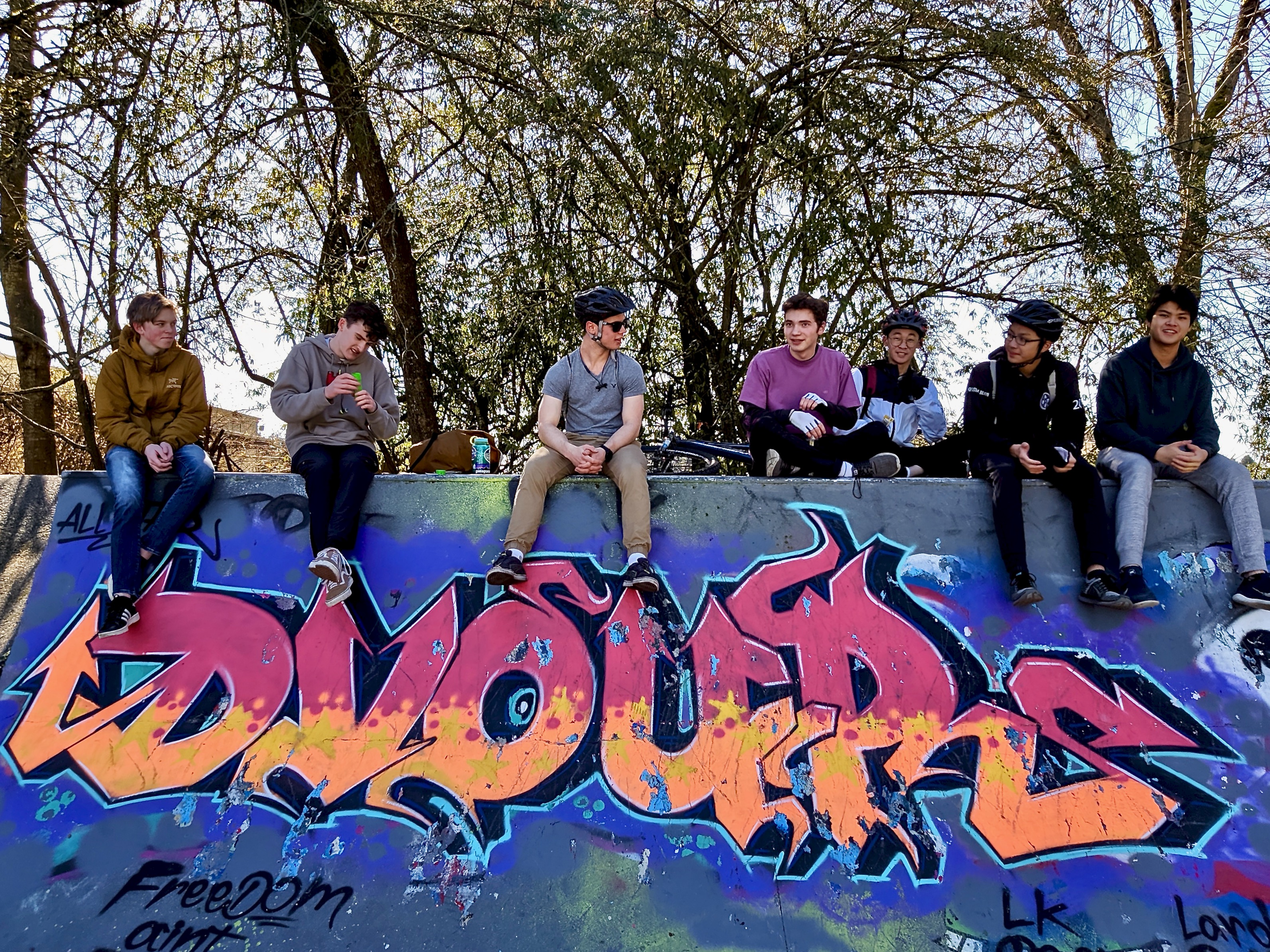 The first bike bois in March 2020, a week after the COVID lockdowns begun
The first bike bois in March 2020, a week after the COVID lockdowns begun
Exploring Together
This emotional openness and reliance on each other to talk through the challenging times in our lives is largely a result of the mini school trips. For five nights we’d share hotel rooms and beds, would undertake scary and exciting physical activities, and would sneak into each others rooms to talk about everything from who liked who to the meaning of life. During the grade 11 Strathcona trip, while the rest of the campsite was sleeping under a tarp at the edge of the forest, a couple of us brought our sleeping bags down to the beach and silently gazed at a black night sky more filled with stars than we ever could’ve imagined. Years later, Jason picked Owen and I up late one night and drove out to a viewpoint past Squamish. As a furious wind whipped past our ears, we stared up at the same burst of stars that we’d first discovered together years before.
Since graduating high school, organizing trips has become second-nature, and has brought more and more non-mini schoolers who share similar values into our friend groups. In 2020 and 2021 we organized camping trips out at Cultus Lake, the first of which brought together almost an entire mini school class. Recently, we’ve used the rave as an excuse to travel, driving down to Seattle and packing seventeen people into a one-bathroom AirBnB. In 2023, our trip to New York with friends from UBC sparked what I know will turn into global-trotting adventures, as we begin to discuss plans for trips to Asia and Europe.
 Friends (mini school and mini-school-minded) before day 1 of 2023 Escapade in Ottawa
Friends (mini school and mini-school-minded) before day 1 of 2023 Escapade in Ottawa
The mini school trips introduced us to the idea of being a global citizen. As motivated, curious individuals, our exploration of the world and our careers continues to pull us farther and farther apart - over the course of a year, three of my good friends have worked in San Francisco, Toronto, and New York. However, no matter how far apart we travel, we’re always able to stay connected, from a quick phone call on the way back from the gym, to crashing on a friend’s couch for a week.
Conclusion
The heads of the John Oliver mini school have a very clear vision for the values they wanted to imbue in the students through the program. The John Oliver Mini School seeks students who are highly motivated, creative, able to think critically and who have a strong desire to become well-rounded global digital citizens…An emphasis is placed on learning and developing leadership skills, community service and social responsibility. The only thing missing from this description of the mini school is that all of this is done in community. I am confident that without a family of motivated, curious, and inspiring friends that share common values and internalize the importance of growing together, I wouldn’t be the motivated, curious, and inspired individual that I am today.
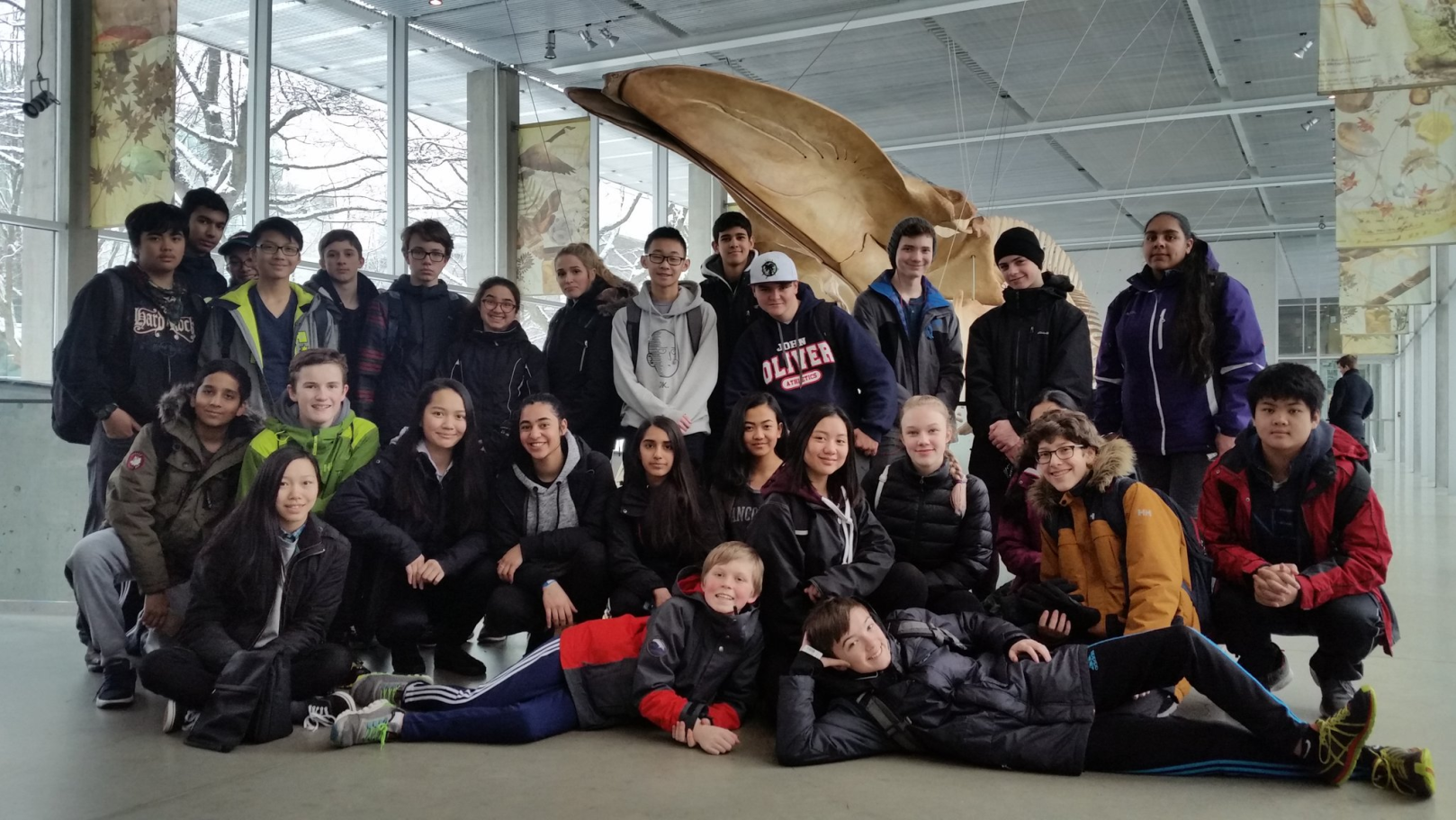 Visiting the Beatty Biodiversity Museum in Grade 9
Visiting the Beatty Biodiversity Museum in Grade 9
 Our last Sun Peaks trip in 2020 (Grade 12)
Our last Sun Peaks trip in 2020 (Grade 12)